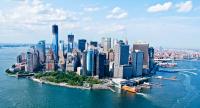
In the United States, the government is still partially shut down, but the economy is holding up remarkably well. According to Mark Dowding, Chief Investment Officer at RBC BlueBay, the Federal Reserve will cut interest rates by 25 basis points at the end of this month, followed by another cut in December. The ongoing shutdown is paralyzing the flow of economic data and forcing the Fed to exercise caution, even though growth remains robust and the labor market tight.
The political noise seems to be barely affecting investors. They are counting on lower interest rates and a soft landing, while Trump is tempering his tone and shifting his focus from trade wars to domestic growth. "Trump wants lower interest rates, which real estate developer doesn't," Dowding wrote earlier, "but he mainly fears inflation." The president is navigating between populist rhetoric and market calm, successfully so far.
Calm also appears to have returned to France. Prime Minister Lecornu has regained parliamentary confidence and appears to be on his way to a budget agreement. However, the financial position remains fragile: the deficit remains around 5% of GDP, and a downgrade to A by S&P or Moody's is "highly likely," according to Dowding.
This political stability comes at a price. Reforms are being shelved, while debt continues to rise. The lesson in both Washington and Paris seems to be the same: markets remain calm, even as politics becomes increasingly volatile.







